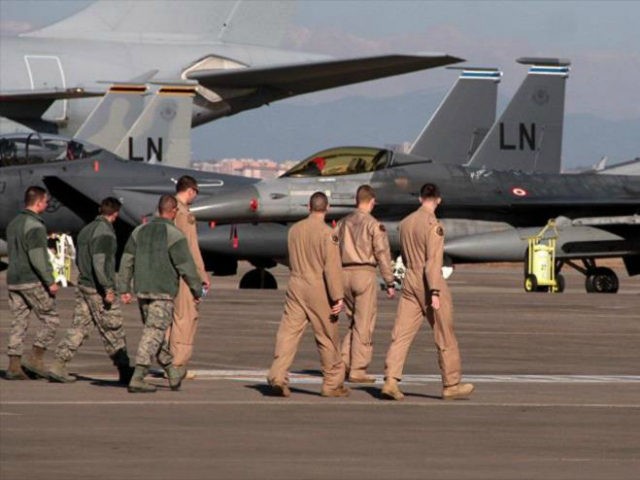The Pentagon on Tuesday announced it was deploying an additional 300 troops to the Middle East region, amid an increasing number of attacks against U.S. bases and the beginning of a new war between Israel and Hamas.
“I can announce the decision to deploy an additional 300 troops to the U.S. Central Command region from home stations in the continental United States,” Pentagon Press Secretary Air Force Brig. Gen. Pat Ryder said at a briefing.
Ryder said the troops will not be deployed to Israel and are intended to support “regional deterrence efforts” and “further bolster U.S. force protection capabilities.”
“These additional troops will provide capabilities and explosive ordinance disposal, communications and other support enablers for forces already in the region,” he said, referring to U.S. troops already deployed to the Middle East.
The 300 new troops adds to the 900 the Pentagon announced would deploy last Thursday.
Those 900 forces included a terminal high-altitude area defense (THAAD) battery from Fort Bliss, Texas; Patriot batteries from Fort Sill, Oklahoma; Patriot and Avenger batteries from Fort Liberty, North Carolina; and associated air defense headquarters elements from Fort Bliss and Fort Cavazos, Texas.
Ryder said those forces were not deploying to Israel, either, and also intended to “support regional deterrence efforts and further bolster U.S. force protection capabilities.”
There have been a total of 27 attacks against U.S. bases in Iraq and Syria since October 17 by Iranian-backed proxy forces. At least 21 U.S. troops sustained minor injuries in those attacks.
The Pentagon said it views the attacks against U.S. forces as “separate and distinct” from the war between Israel and Hamas — despite the spate of attacks in the last several weeks and the Pentagon previously acknowledging that Iranian-backed groups publicly warned that if Israel conducted a ground incursion, they were going to scale up attacks.
Ryder previously said on October 23, in response to a question about the Pentagon moving assets to the region for force protection, “I think we are concerned about escalation based on, you know, you’ve seen several groups throughout the region publicly say, ‘Hey, you know, if there is a ground incursion, we are going to scale up our attacks.'”
On Tuesday, Ryder again insisted that the war in Israel and the attacks on U.S. troops were not linked.
Asked what has led to the increase in attacks over the past few weeks, Ryder responded, “Well, certainly this is not the first time we’ve seen these Iranian proxy groups do these kinds of things for a multitude of purported various reasons that in and of itself is not unusual.”
Ryder attributed responsibility for the attacks to Iran.
Last Thursday, the Pentagon conducted airstrikes against weapons and ammunition storage facilities in Syria in response to the attacks on U.S. bases, saying that there were no casualties from the strikes.
Sen. Tom Cotton (R-AR) slammed the airstrikes as weak and said they could invite more attacks against U.S. forces.
“Retaliation against expendable proxies — especially unoccupied proxy warehouses — merely validates Iran’s strategy to use proxies to attack Americans. They are laughing at us in Tehran. Iran will continue to target Americans until President Biden gets serious about imposing severe costs on Iran,” he said in a statement.
Follow Breitbart News’s Kristina Wong on ”X”, Truth Social, or on Facebook.

COMMENTS
Please let us know if you're having issues with commenting.